UK floods: Government 'made a mistake' by not dredging
- Published
Eric Pickles: "We should have dredged... I apologise unreservedly"
Communities Secretary Eric Pickles says the government "made a mistake" and should have dredged the flood-hit Somerset Levels.
He said it may have relied too much on Environment Agency advice.
There are now 16 severe flood warnings, external - meaning "danger to life" - in place, two in the Somerset Levels and 14 along the Thames in Berkshire and Surrey between Datchet and Shepperton Green.
Further rain is forecast across the UK this week.
The Environment Agency also has more than 70 lesser flood warnings in place across the South East.
Issuing the severe flood warnings for the Thames in Berkshire, the agency said "river levels will continue to rise for at least 24 hours and are forecast to be higher than those experienced in 2003...
"Widespread property flooding is expected in the area and disruption to local infrastructure is possible."
In response to Mr Pickles' comments, it added: "The Environment Agency's immediate priority is to protect people and property in the face of this extreme period of weather.
"Until the danger to people and property has passed, we are putting all our energy and focus into this vital work which is recognised by government."
Soldiers called
The main rail route into Devon and Cornwall remains cut off by the problems caused by the flooding and the storm damage but a line from Somerset to Exeter closed by a landslip on Saturday has reopened.
Recent rainfall in the area has meant water levels have increased by about a quarter of an inch (0.6cm) an hour in the village of Burrowbridge.
In other developments:
About 20 residents are being rescued by firefighters from a caravan park next to the River Thames near Northmoor in Oxfordshire which has become flooded for the second time in five weeks
The body of a man found on the shoreline in the St Cyrus area of Aberdeenshire was that of a missing Fife man, police have confirmed
The prime minister is to hold an emergency Cobra meeting later over the flooding crisis
Road have been closed by flooding and fallen trees in Wales, where 64,000 properties were left without electricity after power cuts
Rail passengers between London and Kent are facing fresh disruption because of a landslip at Meopham in Kent
Reserve soldiers of 7 Battalion The Rifles were called in to dam a breach in the Kennet Canal which threatened an electrical sub-station near Burghfield, south of Reading
The Environment Agency has faced criticism that it has not done enough to help those affected.
Repeated calls for dredging - a process which removes silt from river channels so that water can flow through - were made to government departments by farmers and others in the region at least six months ago, but funding was declined.
The area has not been dredged since the late 1990s, according to Prime Minister David Cameron who visited the area on Friday.
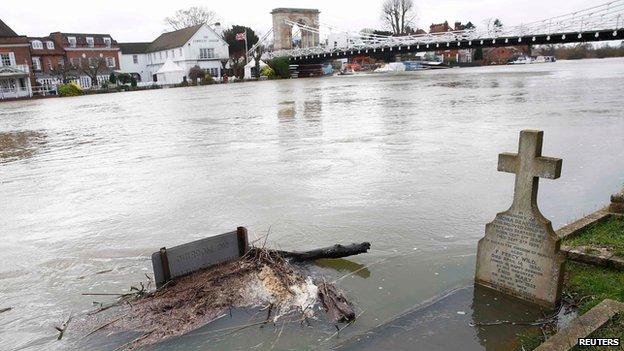
The number of severe flood warnings for the Thames in Berkshire has started to rise
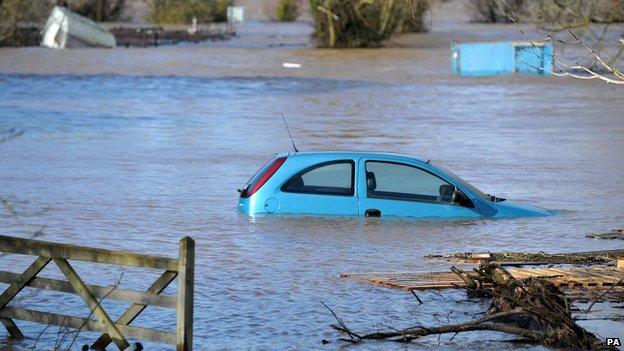
A car sits in flood water on a flooded property at Burrowbridge on the Somerset Levels
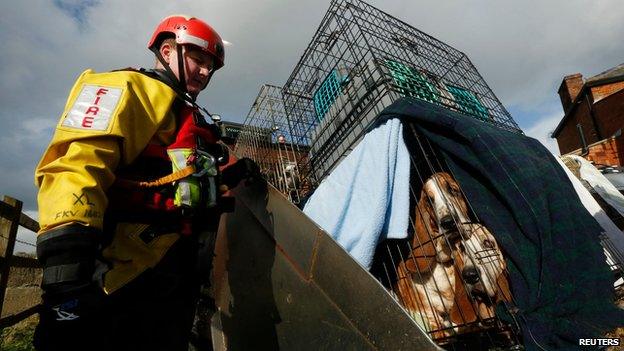
Devon and Somerset Fire and Rescue Service helped transport pet dogs and cats in the Somerset Levels
Speaking on the BBC's Andrew Marr Show, Mr Pickles, who has now been put in charge of the government's flood defence, said: "We made a mistake, there's no doubt about that.
"We perhaps relied too much on the Environment Agency's advice.
"I think we recognise now that we should have dredged and I think it's important now that we get on with the process of getting people back into their houses, and really do some serious pumping."
He added: "I apologise unreservedly and I'm really sorry that we took the advice, we thought we were dealing with experts."
But the Chartered Institution of Water and Environmental Management say the government is to blame for failing to heed the agency's warning on investment in flood management.
Earlier this week the Environment Agency said it spent £45m in the last financial year on improving river flow across England, including dredging and weed clearance.
It says increased dredging would not have prevented the current flooding in the Somerset Levels - due to the sheer amount of water.
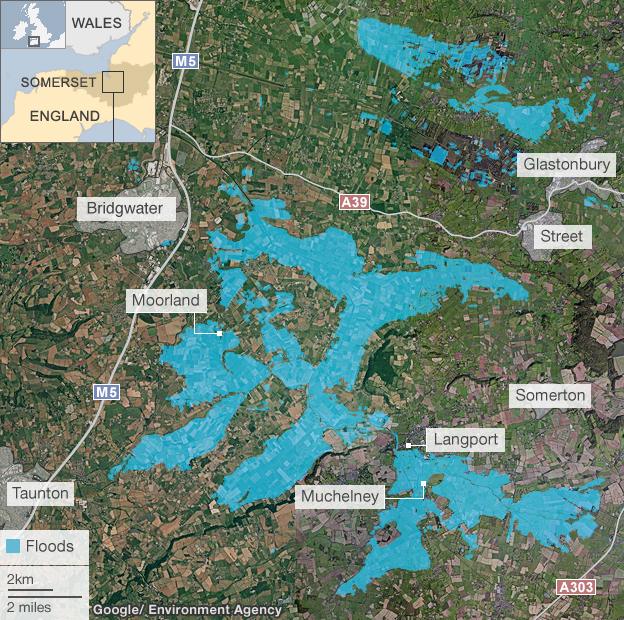
Speaking in Burrowbridge, UKIP leader Nigel Farage called for a public inquiry into how the country deals with river management.
And Tessa Munt, MP for Wells, said: "I brought the flooding minister here to see the whole area back in April last year and we made very clear the need for dredging then, and I think it hasn't happened fast enough but now it's going to happen."
Landslip
A local council leader has also called for the government to do more to help flood victims.
Rachel Sutton, acting leader of Exeter City Council, said more money was needed to improve rail lines.
She said rail lines had been blocked near Exeter 12 months ago because of flooding, and government funding was needed to protect lines which were "vulnerable in a number of places".
"The local authorities can't do this on their own, particularly when we're having to cut back because of cuts to our grant from central government," she said.
Network Rail said the Yeovil-Exeter line which was closed because of a landslip at Crewkerne reopened and a limited service from Exeter to London Waterloo, external is running at a reduced speed through the area.
In Dawlish, where the main line between Devon and Cornwall was destroyed by waves on Tuesday, concrete has been sprayed on to the cliff behind the track to make the area safer in the face of continuing high winds and large waves.
Network Rail said work at the site was "progressing well" in six-hour shifts between high tides.
However, a First Great Western spokesman said the weather had been hampering efforts to repair the track and predicted it would take four to six weeks to sort out.
'No end in sight'
Peter Sloss, of the BBC Weather Centre, said the wind and rain would ease into Monday, though falling temperatures would mean some wintry showers.
But he said there was "no real end in sight", with another area of low pressure reaching the UK on Monday night and into Tuesday, bringing more heavy rain.
Tuesday could see as much as 30mm (1in) fall in Wales and the south-west of England with more heavy rain is expected on Wednesday and Thursday.
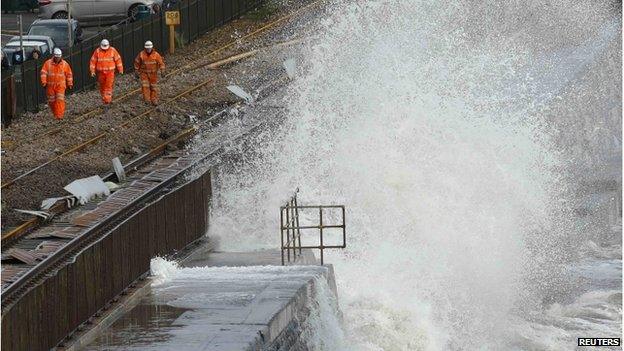
Teams are working in six-hour shifts - between high tides - to repair the track at Dawlish in Devon
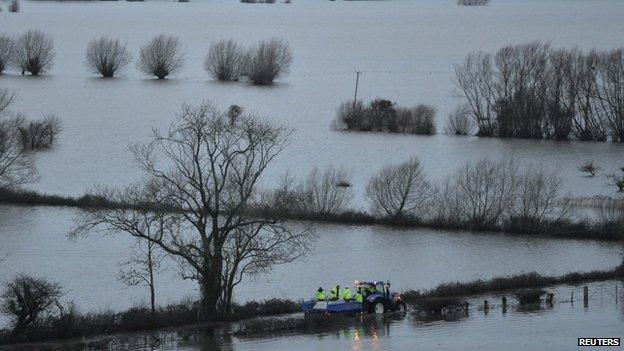
The government has been criticised for not dredging the Somerset Levels
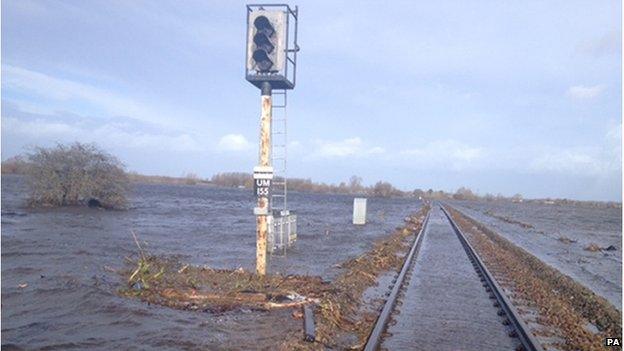
Network Rail said it was "too early to say" when the track at Bridgwater would reopen
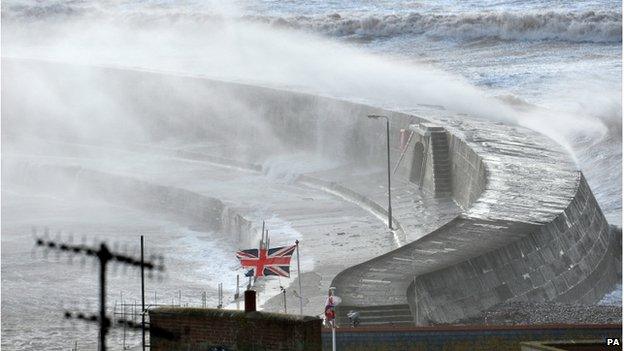
High winds and waves affected much of the south coast - including Lyme Regis in Dorset - on Saturday
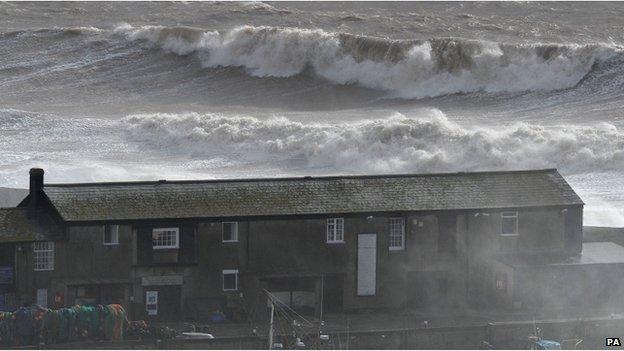
Winds are expected to ease through Sunday, but flood waters could continue to rise in some areas